
Atlas F1 Senior Writer
At the efficient headquarters of Williams Grand Prix Engineering at Grove, southwest of London, Atlas F1 Senior Writer Karl Ludvigsen sat with Sir Frank Williams to discuss drivers, luck, worrying, the financing and management of a Formula One team, and his relationships with backers past and present. The result is a wide-ranging conversation with one of the most interesting men in Formula One. Exclusive for Atlas F1
Frank Williams: Just a couple of times. I never followed his career that strongly. It kind of petered out. He never made it. Which is unfortunate but he seemed to suffer more than most.
Karl: It seems to me that you - and I have to give some credit to McLaren - are the farthest-thinking teams in terms of drivers. You seem to have the longest-range strategy in terms of drivers. What guides your thinking on drivers? What sort of person are you looking for?
Frank: I think for us more than most other teams it's to try and get a driver's prospects well arranged for several years, a number of years. Flavio Briatore certainly seems to be pretty adept at doing that. He has a reasonable stable of good, very good drivers. I certainly wouldn't pretend that we are cleverer than anybody else but we just do our homework as best we can. It doesn't always work, mind you! I must say also that we're reluctant to look too far down the road because you can make investments that just never work out, and we're not in that business. We try and go for a dead cert against the odds of failure.
Karl: Is there such a thing as a dead cert?
Frank: No, it just depends on the car he's got at the time he's driving it. How good your car is and how good your team is to run the car.
Karl: Thinking of your past drivers, can you think of some that you would have called a reasonable dead cert?
Frank: Well if you take away established people who came to us, people who won like Mansell, Senna and Prost, the ones that you'd want to remember of course are Button and Montoya - they're the best ones that come to mind.
Karl: Art Merzario (who raced for Williams in 1975-1976) lifted your team at a time when you really needed it, didn't he? Here was a surprising candidate for a Williams driver, but he did really well for you.
Frank: He was an unusual character. He was very extrovert but he was actually very adept in the car.
Karl: So what you probably want is a person who extracts the absolute ultimate from the car but preferably without going off the road.
Frank: We all dream of that, yes.
Karl: But can this dream be realized?
Karl: The Senna episode certainly must go down as a low point in your history.
Frank: Yes, that and Piers Courage are the two that represent the nadir of this company. Well, it was hardly a company in those days of Piers. But if you lose a driver, no matter who it is - but especially as it was with Ayrton - it's a major responsibility.
Karl: That's an important way to look at it. It is a major responsibility, isn't it? And you feel it that way?
Frank: Yes, definitely. I've often thought you can be given the most unique and expensive piece of china, irreplaceable china, or something like the Elgin Marbles, and when it was in our custody we dropped it. The bottom line is, we dropped it.
Karl: You didn't drop Senna, I think it's clear.
Frank: Yes that's correct. But whatever happened, though, he died in a Williams car when he was looking for a few more years of racing and so were his fans. That's what I meant by that.
Karl: Otherwise apart from Piers you've been pretty fortunate in that respect.
Frank: Two's a lot. But we've had a long career, thirty-three years so far.
Karl: We do have very safe cars now, but still that's an impressive performance. So looking forward, do you plan ahead? You have several drivers on contract and I'd have to credit you with a pretty clear strategy.
Frank: My partner Patrick (Head) and I spend a lot of time thinking and talking and exchanging ideas about drivers, and we have some good people including my son who are always out looking. I don't think they're genuine talent scouts; they've just got lots of time. They adore looking around and they're out there looking at the Formula Three cars and the go-karts. They do a lot of homework.
Karl: Can people approach Williams?
Frank: Oh, yes. If anybody wants to bring his boy along, that sort of thing. But it's difficult to get them in the door because you just can't see everybody. My own view is that if these people want to succeed, they've got to be able to fight their own way up towards the surface, up from the rocks at the bottom of the pond.
Karl: They have to show by combativeness -
Frank: - that they're hardy enough, that they've got the gumption and they've got the cunning to get it..
Karl: So you do have a few people looking out - your son as well.
Karl: Well, if you say so -
Frank: It's a rarefied atmosphere around here.
Karl: Do you feel that way, in a sense?
Frank: In a sense yes, in a sense. I realise I'm very unaware of many things in motor racing. Patrick's much better than me.
Karl: What is your focus now in motor racing?
Frank: The business of Formula One. It's very expensive to run a Grand Prix team. I'm not a marketing person but I've run a business, a small one and a reasonable-sized one, for many years and been aware of, been through, many, many difficulties. You just learn as you go along. It requires a fair amount of planning and anticipation and above all money to keep the show on the road. The results count very much as well; one thing helps the other. That's my primary responsibility - and Formula One politics. Money in, money out and politics. Also I'm modestly involved, but no more than that - and that's not trying to be understated - in the racing side. That's more and more about engineering.
Karl: You once said that the idea is that sponsorship covers your costs and winnings and bonuses are profit. That was twenty years ago.
Frank: You could split it that way again. The prize-money element has increased, thanks to Bernie, by a useful amount in the last five years, but the fundamental rule should still apply.
Karl: To cover your costs with sponsorship?
Frank: That's right. Any serious Grand Prix team makes a useful to handsome profit before tax, and it must. If it's to stay in business, it will stay in business by being successful on the track. And to be successful on the track one of the many elements is to be able annually to re-invest in the company - which means profit.
Karl: Yes, you've got to be able to reinvest haven't you? Have you been able to?
Frank: Yes, definitely.
Karl: For how long?
Frank: Ten years - well, I think we were non-profitable twice since 1985 or '86, something like that. But most of the time in the last decade we've been very usefully profitable before tax.
Frank: Most of it, yes, after tax. We call it cap [capital expenditure]. Most of our free cash goes on cap - new machine tools, the wind tunnel - so all the time it's spend, spend, spend.
Karl: Is part of that the result of a desire to make more of everything here, or have you already achieved that?
Frank: We've always made most of what we race here. It's evidence of the endlessly escalating cost of Formula One, about which I don't complain. It's just how it is, the evolution of this particular business. And being prudent with how you spend your money, which is a pseudonym for saying controlling your costs, that's quite different.
Karl: Speaking of sponsorship, I wondered if you reflected after September 11th that one of your sponsors in your Saudi period was the senior Mr Bin Laden.
Frank: Well, a few people reminded me about it. It was an arms'-length deal. We needed the sponsorship at the time. It was done through a third party, one of the young princes, and he did all the groundwork in the Kingdom - making all his good buddies pay up. One of the people was Bin Laden's father. I don't remember which member of that large family paid. It was about 1980 or '81 we got that sponsor, a one-off thing. It only appeared on one year of our cars.
Karl: If I'm not mistaken your deal with BMW is an unusual one. A friend of mine at BMW said, "We bought a white car." In other words the deal was worked out in such a way that BMW had control of the exterior of the car. Its that a fair characterization?
Frank: It is, to some extent. Without being too explicit, a deal was made at a specific number in 1997 with BMW's Mr Pitschesreider to be the engine supplier and technical partner of the team. There was a useful amount of funding towards the overall costs that came with the team. That's not a great secret. Subsequently a decision was made by the BMW board to obtain from us, for a secondary fee, the right to control the livery. They brought the color code, which was useful. It was more money for us but it gave them control of the exterior of the car. We decide the sponsors. The marketing rights belong to Williams.
Karl: You didn't relinquish those rights.
Frank: No - otherwise we might as well have sold the team itself. It was a very good deal for BMW and a deal we're happy with also. A good deal on their side, I think, I'm not trying to pander to them but a number of people always say, "Go on, sell the team to BMW." But the truth is they don't need to buy it, they've got everything they want. Unless they want to design the car themselves in Munich, operate it from Munich and be a full team like Toyota in Munich, which would cost them far, far more than they're spending now. Our side costs more than they spend - by a modest amount, not an enormous amount. And then they'd have to go through years of learning all the things not to do. We're very happy with it. They're a good partner, a very good partner.
Frank: My own judgement is I don't think they'll go for that. I could be wrong. I just don't see it as being of any benefit to them.
Karl: Is the length of the commitment that you jointly have publicly known?
Frank: It's till the end of '04, which is just around the corner as far as I'm concerned. As far as planning is concerned.
Karl: Yes, because it's coming right up, isn't it, from your standpoint?
Frank: Two and three quarter years, no time at all!
Karl: So you'd be looking to have an understanding this year of what happens after that, wouldn't you?
Frank: Yes, that's right.
Karl: Speaking of livery, you use blue as a key color.
Frank: That's their choice, you see. But I'm delighted. I'm delighted with blue!
Karl: If I'm not mistaken you adopted blue because you bought a Brabham that was already blue.
Frank: Exactly. For Piers Courage. It was ordered from Brabham by the son and heir of the Earl of Denby. He subsequently became the Earl of Denby. He ordered a dark-blue Formula 2 Brabham but declined to take it in the end. I bought it direct from Brabham for Piers.
Karl: You stayed with blue and you're quite happy with that.
Frank: Delighted, sure. We've been taken out of blue previously - by de Tomaso once in a while or Winfield on the cars in 1998 and '99 - but we've always been happy to come back to dark blue.
Karl: A quote that I particularly liked from you was: "It is terribly easy to psych yourself out in racing." It speaks to getting into situations where you get so involved in a certain problem or issue that you lose sight of the main objective. Would that be the right way to put it?
Frank: Yes, correct. It is, yes.
Karl: Do you see that happening in racing quite a lot?
Frank: It probably happened on Sunday, yes.
Frank: Well to some extent yes. I can't be more specific…
Karl: So it's still a concern to be sure you're standing far enough back to see the forest and not the trees.
Frank: That's exactly right.
Karl: And you also said that you're an habitual worrier.
Frank: Yes, definitely. I love to worry. If it's a habit I may as well like it!
Karl: How do you go about it?
Frank: I let my mind ramble and suddenly it gets lost, psychs itself out: "Oh, here we go again." And I've got something else to worry about. Here's something else I hadn't thought of! I'll say I'm worried about a problem until I put my light out. I'm well known by the several nurses who take turns - and my wife previously - to just pass out at night. I just can't be woken up. Nobody can wake me up. I sleep so deeply people just can't wake me up. They say "Frank" in my ear but I just don't wake, apparently. I stay asleep for six hours and then I'm up again. I'm very lucky, very lucky.
Karl: Yes, that is lucky, because worriers may have problems with sleeping.
Frank: And with Patrick [Head] - he's not a worrier, but what he's got is a hyperactive brain. About six or seven years ago, sitting in that chair as he always does when he's here, he told me, "You know, Frank, I've discovered that the more you use your brain the better it gets." He is living evidence of that. I've known him for twenty-five years and he is a cleverer man today than he was ten or fifteen years ago. That's a fact.
Karl: "Use it or lose it" is the saying, isn't it?
Frank: Sure. So while I don't do any worrying once the lights are out, Patrick will wake up at four in the morning and he can't get back to sleep again. We're different like that. I just worry, well, that we've always got plenty of money and if we haven't, how are we going to cover the following month? That sort of thing. I don't worry about a race meeting. I don't worry about that. In fact I should say now that Grand Prix cars are so complicated that when you take the bodywork off, I look at them and I say, "Forget it - it's too complicated for me." I've just given up. There's no point in worrying about it. Like once you've boarded a plane, airside, and once in a while you see the engine cowling is off, and you see a myriad of pipes and you think, "Aero engine? I can't fucking believe it! It's just so full of shit, it'll fall apart." And they never do.
Karl: They never do.
Karl: Can Patrick keep up with all this technology?
Frank: Of course he can, yes. He knows what everything is! I get really pissed off sometimes.
Karl: That he's on top of all of it. But you didn't start out from a technical perspective, did you?
Frank: I've never been technically gifted or knowledgeable, no.
Karl: You grew up without a father. Did you ever know your father?
Frank: I met him about five times in my life. I haven't seen him for fifteen years now. My mother brought me up.
Karl: Do you feel that had some bearing on the Frank Williams that we have today?
Frank: I don't think so, no. I was parked when I was very young with her sister and her family, for a couple of years or so - I can't remember now - and also my grandfather. I can't say that it was awful or it was terrible, or unfair. I just never thought that at all.
Karl: Your mother must have been exceptional.
Frank: She was. She was a schoolteacher and she made a sacrifice so she would be able to afford to send me to a very good - not that expensive - Scottish public school run by priests. I had a very good education. And a few good lashings as well!
Karl: To get your attention -
Frank: Yes, a leather strap. You respected them - when you got punished - so you tried to avoid being stupid again.
Karl: You were good at languages. Are you still good at languages?
Frank: Not as good. I don't go to France and I do go to Germany a bit but they all speak such perfect English in Germany. You want to learn, but - I'm reasonable in French and Italian and groping in German.
Karl: Speaking of aeroplanes and aeroplane engines, you made a habit of logging flights and aeroplanes -
Karl: But you're still interested in aviation?
Frank: Yes, my favourite aeroplane in the world being the B52. I read Aviation Week every week. I'm very keen on aviation; it's still my second love. Especially the military stuff. I'm a big admirer of the US military - and of the country. Fantastic place.
Karl: America, yes. It's becoming an empire and some say it ought to start acting - in the world today - as if it's having that level of influence.
Frank: Yes. I read a great article in the Financial Times about eight or nine weeks ago. It began by talking about what you just said, and then it said in China and Russia the military chiefs will be pondering what they saw in Afghanistan and saying, "It's over for us, we'll never ever match it." Well, they're wrong if they think that because everything changes in this world. The moment you used the word "empire" a thought crossed my mind - I'm sure you know what it is - that no empire has ever ever lasted forever. The biggest challengers for world supremacy in twenty years' time will be the Chinese. But I don't think they've woken up to that in Washington.
Karl: Right, back to luck. Fangio was a big believer in luck. He felt that success was 50 percent the car, 25 percent the driver and 25 percent luck, and he felt he was lucky. "I was lucky" was his view about his career.
Frank: I think luck's a bit like God, in that you either believe in it or you don't! You believe in praying or you do believe in luck or you don't - things happen like that. I think in Formula One the general attitude is that you've got to be able to control everything that's going to happen. You're unlucky when you collect a puncture. That's one of the very few things -
Karl: Yes, that's an example of luck, isn't it, because -
Frank: - it's almost uncontrollable.
Karl: Yes. So the luck element concerns uncontrollable things, doesn't it? Like Alan Stacey being hit by a bird at Spa, something like that. It's completely uncontrollable and you can't pre-plan for it. But the belief in Formula One is that of course you can pre-plan.
Frank: You can on most things, yes. You can cover most things.
Karl: It's like Porsche's Norbert Singer said about Le Mans. He said, "Every year we learn something else that we should be doing, and every year the list gets longer."
Frank: A very good quote, yes!
Karl: At one time you saw money and property as a kind of index of your personal success. I think you felt it was something that said, "Well, Frank Williams has made it." How would you look at that?
Karl: You wouldn't use that characterization today?
Frank: Not today, no. Just until I was able to get some races and Championships. That was the absolute ingredient, you know.
Karl: Yes. And you've been pretty good at it. I calculated your average win rate, which is 27.1% of races entered.
Frank: No, it can't be. I can't believe it
At this point Patrick Head knocked and entered.
Frank: Hello, Patrick! Patrick, this is Mr Ludvigsen. He's just said something very interesting…
Patrick Head: I remember your name very well. You were with Ford?
Frank: What a memory! Now what was I telling you about him and his bloody brains! Do you know what he was saying; he said our strike rate is -
Karl: - 27.1% of starts resulted in wins.
Patrick: Did they really?
Karl: Yes, this is probably up to last year. And you've been lowering it lately but you're ahead of McLaren at 25.5% and Ferrari 22.1%. The only guys that are significantly better are Vanwall - I think they're in the 30s - and of course Mercedes in the post-war years were 75%. But as far as I can tell, yours is the top average rate at the moment.
Patrick: Frank and I generally do spend our time looking forward, because I think we've got an idea that the moment you start looking backward that's the time when you're actually getting old! So we don't tend to spend much time looking backward.
Karl: I can sympathise with that because, as I said to Frank, I think you're outstanding in booking support, booking drivers, booking sponsorship forward. That's a sign of success in this business if you can achieve that, isn't it?
Patrick: We have to do much longer-term planning now, don't we? Both from a technical point of view and personnel and everything. All the numbers are so big on the budget side that you've got to plan enormously forward. And I always used to be massively impressed with Frank because he never struck me as particularly worrying about things, but I've got the impression recently that some of the financial numbers make him worry a bit.
Frank: I've always worried about it. I used to worry about racing cars. Now I don't because they're just so complicated, it just happens. So I don't worry about it.
Patrick: That's the thing, and it's very much about teamwork. I know that's rather as if one's talking to the press, but it is enormously about teamwork and people doing their bit of the job very well and also having a look over the fence just to make sure you haven't got too many gaps between people doing different jobs. It's no longer the single superstar up front, holding all the balls in the air. There's no one man that can do that.
Karl: But where do you get your people? That's one of my questions. How do you? Do you poach?
Frank: (Patrick grows them.)
Patrick: I think the opposite is true, actually. It's very rare for us to take from other teams. It does happen every now and then, and every now and then we've lost people to other teams and then they've come back to us - or the ones we wanted to take back. There have been some cases where we've taken straight from universities. Those tend to be people we've already been in touch with while they've been at university, or maybe they've been doing a PhD and we've provided the content of their PhD and followed them through their PhD and then been very impressed with what they're doing. But they've tended to be in the more boffin-y areas where experience of work hasn't really been that important. The general engineering side we've tended to recruit from the aircraft industry, from general advertising and interviewing people.
Karl: One thing Williams has done on and off is non-Formula One projects like the Le Mans car for BMW and British touring cars for Renault. Years ago you did a rally car for MG Rover -
Frank: Oh, that was Patrick's favourite car! The little Mini-Metro -
Patrick: No, not at all! It's an ugly little thing. Actually if you open Motoring News even to this day it is still winning rallies. It's probably won more individual national rallies than any other car make, which doesn't mean to say it's a good car. It actually just happens to have been particularly amenable to private entry.
Karl: Well, I was trying to get my RS1700T Escort going at that time and you guys succeeded and we didn't. We didn't get ours into production.
Patrick: We just provided Austin Rover with three prototypes, I think. They were quite a long way from the car that it ended up being.
Karl: But is this the kind of thing that Williams Grand Prix Engineering can do without taking away from the main activity of the company? The demand is so great on your core capabilities. Can you still do this sort of thing?
Frank: Did you come in for a particular reason?
Patrick: I came in to talk to you about a request for new employees, Frank, but I'll leave it until later.
Frank: See you later, Patrick.
Karl: Earlier I said that maybe the Senna experience was a low point for you emotionally. Maybe that's not fair -
Frank: The Piers Courage affair was a very difficult time emotionally. Ayrton wasn't. I mean, it affected me. I can't say I was super-close to him, but I very very much admired him. I'd been very friendly with him since 1982-83, a keen fan of his. But I was much older than Ayrton whereas with Piers I was one month older, I think, and just much closer to Piers in every way. And I was much younger to handle a shock like that, whereas with Ayrton I'd seen it before. I remember - and I shouldn't say this - but in 1977 or '78 I said to myself, "I know what's different. I don't go to so many funerals as I used to!" In the early seventies you went to about two to three funerals a year.
Karl: On the other side, what strikes you as a high point or something that happened that was tip-top for you?
Frank: Winning the Championships was always very satisfying. You could never enjoy them for long because the next day everyone's after you, trying to crush you. I suppose that's the main thing - and watching this company grow.
Karl: Watching this company grow, yes. How many people do you have here?
Frank: I'd rather not say but it's a lot of people. McLaren have a number and we're very close to - not out of touch with - that number. We keep these sorts of things a secret. You don't give away your dispositions! Not that McLaren are enemies. Patrick and Ron Dennis and myself - we all think the same, in the same way.
Karl: That's important on the political side, which is as you say one of your key areas of interest at the moment.
Frank: That's right.
Karl: Frank, thank you very much. I really enjoyed it and I appreciate your time.
I had the pleasure and honor of sitting down with Sir Frank Williams at his offices on April 3rd, the Wednesday after the Brazilian Grand Prix. Frank quickly disabused me of using his knightly title. I began with a bit of banter about the fact that we both saw our first Grand Prix races in 1958 and also that we'd both commissioned designs from Len Bailey to be built by Mo Gomm, in his case a Formula One car and in mine the first Ford C100 Group C car. Then I turned to a theme that is much on my mind at the moment.
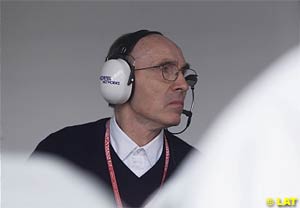 Karl Ludvigsen: I'd like to try to understand what luck has to do with this business that we're in. When you think of luck you think of Chris Amon, don't you? There was a driver who was supposed to be unlucky. And he drove for you a couple of times -
Karl Ludvigsen: I'd like to try to understand what luck has to do with this business that we're in. When you think of luck you think of Chris Amon, don't you? There was a driver who was supposed to be unlucky. And he drove for you a couple of times -
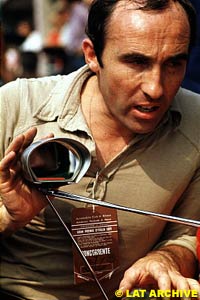 Frank: Yes, I would say we have a very fine team right now, with Ralf and Juan. Mainly the drivers we've had like Nigel, like Ayrton - well I can't really quote because he was with us so little time - and Alain Prost. These are wonderful drivers who extracted almost perfection from the car.
Frank: Yes, I would say we have a very fine team right now, with Ralf and Juan. Mainly the drivers we've had like Nigel, like Ayrton - well I can't really quote because he was with us so little time - and Alain Prost. These are wonderful drivers who extracted almost perfection from the car.
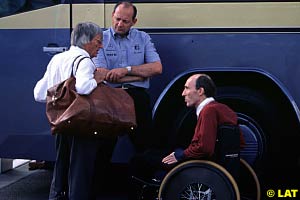 Frank: They're not employed to look out. It's not their livelihood; they don't do it full-time. But people like my son and one or two journalists whom I respect very much - they do love what they do and people like them know what's going on far more than I do.
Frank: They're not employed to look out. It's not their livelihood; they don't do it full-time. But people like my son and one or two journalists whom I respect very much - they do love what they do and people like them know what's going on far more than I do.
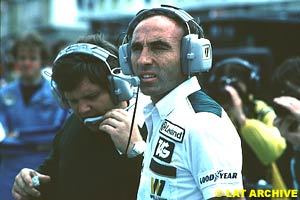 Karl: And a lot of that has been poured back into facilities?
Karl: And a lot of that has been poured back into facilities?
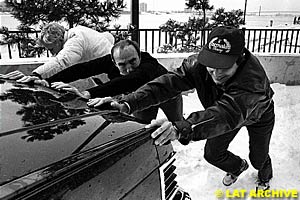 Karl: You would expect them to continue to operate in that way rather than have ideas about building the car?
Karl: You would expect them to continue to operate in that way rather than have ideas about building the car?
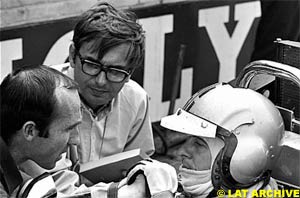 Karl: You think so?
Karl: You think so?
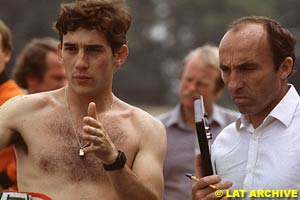 Frank: Grand Prix cars break more often than aero engines. Do you see my point? Whereas ten, twenty years ago I could follow everything and I knew what this and that was. It was much simpler. I could worry about every little thing! It wasn't my business to - Patrick was the engineer - but I just worried.
Frank: Grand Prix cars break more often than aero engines. Do you see my point? Whereas ten, twenty years ago I could follow everything and I knew what this and that was. It was much simpler. I could worry about every little thing! It wasn't my business to - Patrick was the engineer - but I just worried.
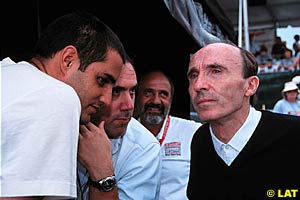 Frank: I did when I could write, but when I broke my neck I lost that ability so that was a habit that I dropped. And I travelled a bit less from that point as well.
Frank: I did when I could write, but when I broke my neck I lost that ability so that was a habit that I dropped. And I travelled a bit less from that point as well.
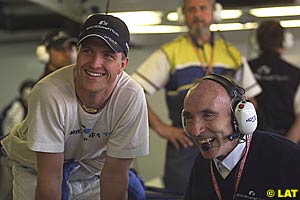 Frank: That was my foolish way of looking at it.
Frank: That was my foolish way of looking at it.
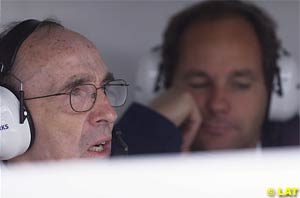 Karl: They are tremendously complex, but mastering these complex systems is what it's about, isn't it?
Karl: They are tremendously complex, but mastering these complex systems is what it's about, isn't it?
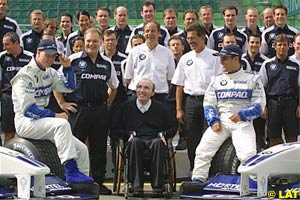 Patrick: I think we've concluded that at the moment it isn't on because the desert that we've had - it's beginning to be filled in a bit - since 1997 is completely unacceptable. That rather implies that it did take away from our core activity, and I suppose in a way it did. But it's so important to this company to be successful in Formula One, (a) for its own purposes and (b) for our partners' purposes that we're really not looking to that type of activity at the moment.
Patrick: I think we've concluded that at the moment it isn't on because the desert that we've had - it's beginning to be filled in a bit - since 1997 is completely unacceptable. That rather implies that it did take away from our core activity, and I suppose in a way it did. But it's so important to this company to be successful in Formula One, (a) for its own purposes and (b) for our partners' purposes that we're really not looking to that type of activity at the moment.
Please Contact Us for permission to republish this or any other material from Atlas F1.
|
Volume 8, Issue 19
Atlas F1 Exclusive
A Conversation with Frank Williams
Interview with Pat Symonds
Rumble on the Ramblas
Jo Ramirez: a Racing Man
Tech Focus: Innovations in a GP Car
Austrian GP Review
The 2002 Austrian GP Preview
Local History: Austrian GP
Columns
The Austrian GP Quiz
The F1 FAQ
Rear View Mirror
Bookworm Critique
Elsewhere in Racing
The Grapevine
> Homepage |